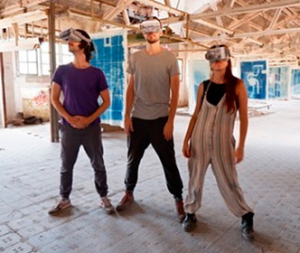- 14th EDITION 2022 / 2023
- 13th EDITION 2021 / 2022
- 12th EDITION 2020 / 2021
- 11th EDITION 2019 / 2020
- 10th EDITION 2018 / 2019
- 9th EDITION 2017 / 2018
- 8th EDITION 2016 / 2017
- 7th EDITION 2015 / 2016
- 6th EDITION 2014 / 2015
- 5th EDITION 2013 / 2014
- 4th EDITION 2012 / 2013
- 3rd EDITION 2011 / 2012
- 2nd EDITION 2010 / 2011
- 1st EDITION 2009 / 2010
Urati laboratori IN RESiDENCE at the School Escola Eixample
www.instagram.com/urati_lab

Urati laboratori
The Urati laboratory was created in 2020 with the aim of forming a stage research laboratory focused on creation from the stage scene. We work in long creation processes where the main objective is not the presentation of closed proposals but rather research based on common concepts. The company’s members come from the fringes of the scene, made up of scenographers, plastic and sound artists, audio-visual creators, technological researchers and philosophy theorists. Our first proposal in this regard is Tardígrados, involving research into the concept of the territory and the fugacity of the memory of the spaces we inhabit, from an installation that mixes sound atmospheres, an organic landscape and virtual reality devices, in collaboration with social entities and centres for the elderly of the area in which we reside. We began with the collaboration with the SALMON Festival, then with L’Artesa Theatre, and later we continued the research with the support of the residencies of Konvent and L’Estruch in Sabadell. Our second proposal is No hay tierra más allà, a research project on the concept of migration in our virtual world, with the staging carried out in collaboration with various entities and groups of immigrants from the area.
The Urati laboratory company is created with the desire to explore the shock between the virtual world and that of the body “in real time”. This phenomenon is undoubtedly the main driving force of both the artistic and theoretical research that the company faces in all its projects, with a clear generational focus, because the people who have been born and grown up during the new millennium face the disintegration of materiality in all its fields (corporal, technological and social). This inherent reality is what leads us to work on our research in the search for new languages using different kinds of technological elements (such as virtual reality, the use of computing technologies, the development of free software and the research with virtual avatars, among others), all with the intention of becoming familiar with the technology developed by the economic powers and putting it at the service of the citizens, a hacker ethic applied to the stage that seeks to re-group the new communities that have emerged and will continue to appear in the 21st century. For this reason, our proposals always focus on a social vision, seeking to unite avant-garde artistic and technological research with the various invisible communities who fall outside the system. Above all, Urati is a research laboratory. This means that we apply to our work logics a very different approach to the production dynamics that are usually applied both in artistic and scientific fields, seeking to generate ongoing research by fleeing from a production-exhibition logic and deepening the dynamics that characterise a research group, based on collaborative, transversal, horizontal work, suppressing hierarchies and focusing on research and curiosity for everything unknown and yet to be discovered.
In the Eterns profetes de la fatalitat project, Urati is formed by Albert Chamorro, Marta Lofi and Sergio Camacho.
Presentation updated in September 2022
School Escola Eixample
https://www.ieeixample.cat/The Eixample School’s second consecutive participation in the iN RESiDENCE programme. After the creation process led by David Franch, with the mediation of the Teatre Lliure, this year the school is taking part in the programme with a group of 3rd-year secondary school students.
/
The educational project of the Escola Eixample School, created in 2020 from the integration of the former Immaculada Concepció School into the public network of educational centres in Barcelona, in a neighbourhood with a high demand for public places, is based on contemporary creation.
Presentation updated in September 2024
Participants
Students from 3rd of ESO
Teachers
Marta Arteaga and Eva Suàrez
Curator and coordination
Centre de les Arts Lliures de la Fundació Joan Brossa
Management
Institut de Cultura de Barcelona
Consorci d’Educació de Barcelona
